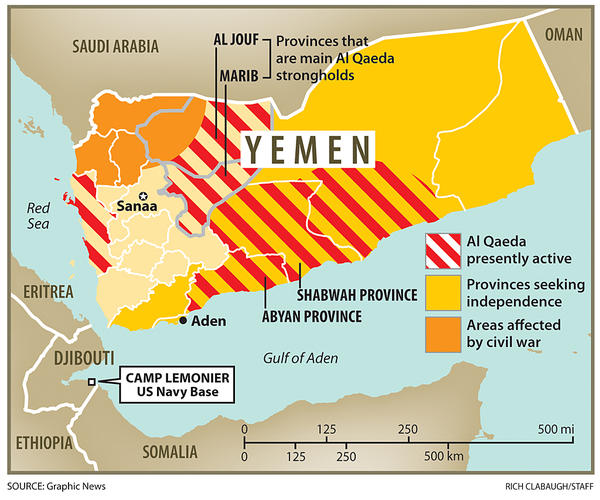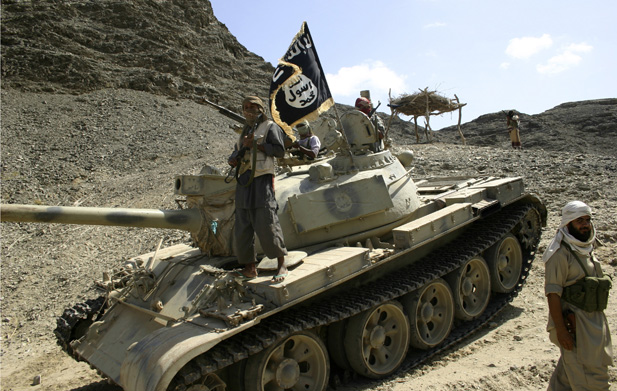Al Qaeda is no longer a centralised organisation. The continuous killing or capturing of al Qaeda’s central members in both Afghanistan and Pakistan has forced al Qaeda to rely on their affiliates to remain operational. This article will now look at the emergence of al Qaeda in the Arabian Peninsula (AQAP) which arguably, at this time, poses the greatest threat to the United States and its allies. In recent years the United States has carried out more drone strikes against targets from al Qaeda in the Arabian Peninsula than on al Qaeda central targets within the AfPak region.
AQAP was created in early 2009 with a merger between the Saudi and Yemeni offshoots of the organisation with the initial roots of the merger having been planted as early as 2006 during a prison break in Yemen in which 23 militants escaped. Combined with the weakening of al Qaeda central, the killing of bin Laden and many other top tier commanders and the weak central government in Yemen, the strength of AQAP has been increased in the aftermath of the Arab Spring. This has strong similarities with the first generation of al Qaeda, which between 1990 and 2001 was able to cultivate a safe haven in Afghanistan. Now a similar threat is posed by AQAP from Yemen. I believe this threat to be more dangerous as AQAP has benefitted and learned from previous mistakes and successes over the past two decades.
 Osama bin Laden long set his sights on the Arabian Peninsula. There was a personal history of his father being from Hadramut in southern Yemen, and Osama’s taking his fourth wife, Amal al-Sada, from Yemen as a political arrangement between him and a Yemini Tribe in order to boost recruitment in Yemen. Bin Laden began sending money and representatives to Yemen as early as 1990 and saw it as key to the future development of al Qaeda. This push to bolster al Qaeda’s presence in Yemen increased around 2000 when bin Laden was looking for possible locations for establishing a new headquarters after the 9/11 strikes, which he was planning then. Yemen provided an almost perfect location due to its combination of political instability and its geographic terrain, surrounded by mountains and consisting of desert. Furthermore, there is a strategic geographical importance with Yemen located in close proximity to the Persian Gulf, the Strait of Hormuz, the Arabian Sea and the Gulf of Aden.
Osama bin Laden long set his sights on the Arabian Peninsula. There was a personal history of his father being from Hadramut in southern Yemen, and Osama’s taking his fourth wife, Amal al-Sada, from Yemen as a political arrangement between him and a Yemini Tribe in order to boost recruitment in Yemen. Bin Laden began sending money and representatives to Yemen as early as 1990 and saw it as key to the future development of al Qaeda. This push to bolster al Qaeda’s presence in Yemen increased around 2000 when bin Laden was looking for possible locations for establishing a new headquarters after the 9/11 strikes, which he was planning then. Yemen provided an almost perfect location due to its combination of political instability and its geographic terrain, surrounded by mountains and consisting of desert. Furthermore, there is a strategic geographical importance with Yemen located in close proximity to the Persian Gulf, the Strait of Hormuz, the Arabian Sea and the Gulf of Aden.
AQAP is also the force behind the English-language digital magazine Inspire, aimed at radicalising and recruiting new members mainly in the United States and the United Kingdom. Inspire is a well edited and designed digital magazine which represents al Qaeda’s structure and message. The ongoing publication of the digital magazine, even after the killing of both Samir Khan and Anwar al Awlaki, its two primary sources, is further evidence of the resilience of the al Qaeda leadership.
A third important aspect of AQAP is its understanding of the tribal system in Yemen. The leadership made sure to gain the support of local tribes in order to ensure the survival of AQAP. The effort to win over the tribes started as early as 2000 with bin Laden’s sending envoys to Yemen with plans of eventually moving the base of operation there, however, this was disturbed after the US led Great War On Terror began in 2001. The effort was re-ignited by al-Zawahiri in 2009 urging the tribes in Yemen to rise up against President Saleh and support the mujahedeen.
Yemen’s complicated tribal structure predates Islam. The average district with a population of around 50,000 has over thirty tribes and almost ten confederations. These tribes are strong, independent, well-armed groups with their own systems of governance. Similar to the Pashtun tribes of Afghanistan, they follow a code of honour and protect guests, meaning that by gaining the loyalty of the tribes, al Qaeda is guaranteed protection and free roaming in the area, virtually independent of the central government. Furthermore, by having many of its members marry Yemeni women, al Qaeda has used marriage as a way to gain tribal loyalty. This combined with historical ties and family connections means that al Qaeda enjoys large support and is able to recruit new members. 
Although only a franchise, in terms of recent operations, AQAP has superseded al Qaeda central. Besides launching attacks, the AQAP has also provided ideological support and was the first to help fill the propaganda vacuum created by the Arab Spring. While the central al Qaeda leadership remained silent during the early days of the revolutions, the AQAP was quick to label protests as a tsunami of change, calling them good for jihad and al Qaeda. Al-Awlaqi was clear in suggesting that the changes would open doors for al Qaeda to exploit and that, although al Qaeda did not lead the uprisings, it was the result of years of struggle against the apostates.
Besides leading the way both ideologically and operationally, due to its resiliency and adaptability, AQAP has developed into a role model for other affiliates. AQAP sought permission from al-Zawahiri before conducting any large-scale attacks, however, this was the extent of the leadership connection. AQAP has shown it is able to plan and devise attacks autonomously, attract new recruits and provide funding, and may well be the future hub for all al Qaeda operations. With the development of the Arab Spring, AQAP is gaining ground in Yemen which has provided it with the perfect base from which to establish new training camps and extend assistance to all other al Qaeda franchises.



